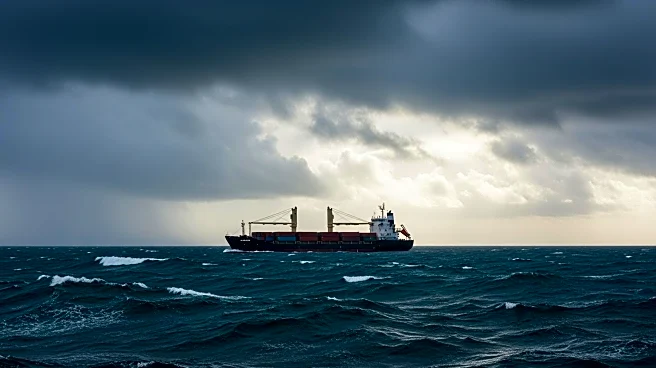What is the story about?
What's Happening?
The U.S. Trade Representative (USTR) is set to implement new port fees on October 14, targeting Chinese-built and China-based operators. Major ocean carriers, including Ocean Network Express (ONE), HMM, CMA CGM, and Maersk, have announced they will not impose additional surcharges or service fees to offset these costs. These carriers have assured customers that they will maintain current service plans and monitor regulatory changes closely. However, Chinese carriers like COSCO face challenges due to these fees, which could impact their operations significantly. In response, some companies, such as Seaspan, are relocating headquarters and reflagging vessels to mitigate the impact. China has announced potential countermeasures, including fees on vessels at Chinese ports and restrictions on port access, in retaliation against the USTR fees.
Why It's Important?
The introduction of USTR port fees represents a significant shift in U.S. trade policy, potentially affecting the global shipping industry. The decision not to pass these fees onto customers by major carriers could help maintain stability in shipping costs, which is crucial for industries reliant on maritime transport, such as the chemical industry. However, the fees could lead to increased operational costs for Chinese carriers, potentially disrupting supply chains. China's retaliatory measures could further escalate trade tensions, impacting international maritime operations and global trade dynamics. The situation underscores the interconnectedness of global trade policies and their potential to influence economic relations between major economies.
What's Next?
As the USTR fees take effect, stakeholders will closely monitor the impact on shipping operations and costs. The USTR is expected to provide further clarity on the fee structure, addressing concerns raised by industry stakeholders. Meanwhile, China's countermeasures could lead to further negotiations or adjustments in trade policies. Companies may continue to explore strategic relocations or reflagging to mitigate the impact of these fees. The evolving situation could prompt further responses from international trade bodies and governments, potentially influencing future trade agreements and regulations.

















